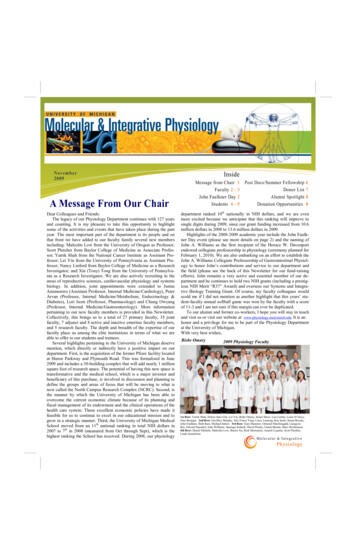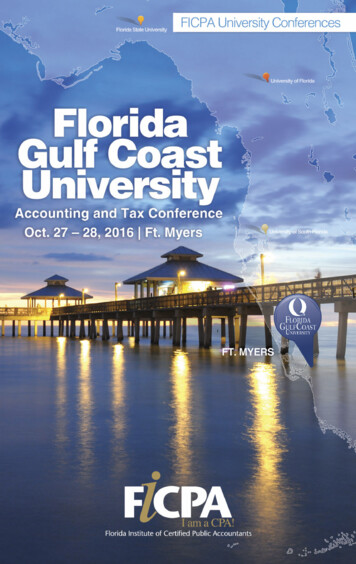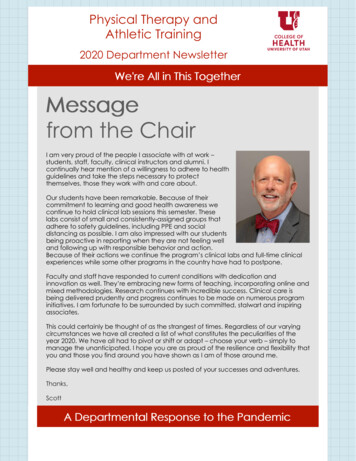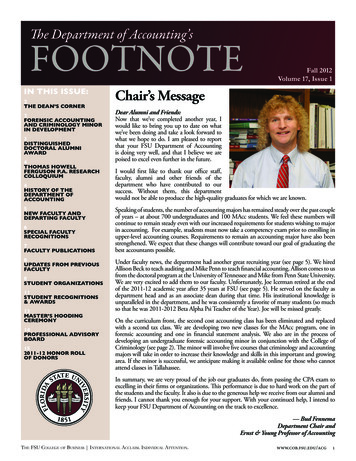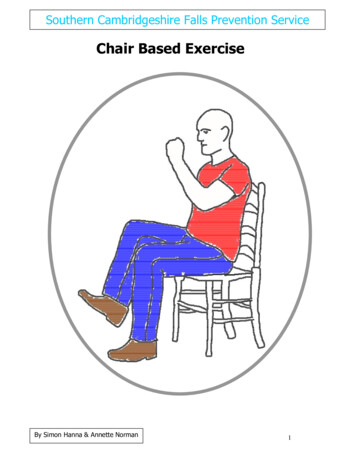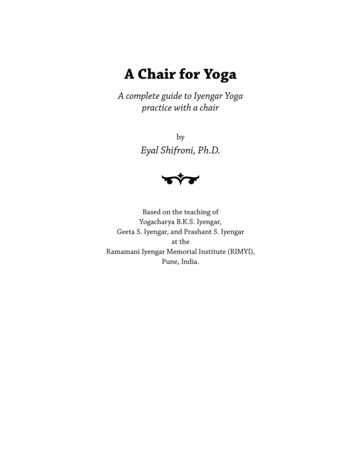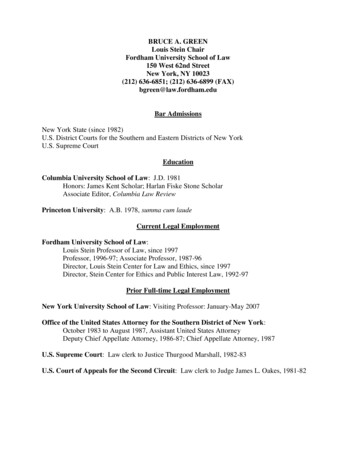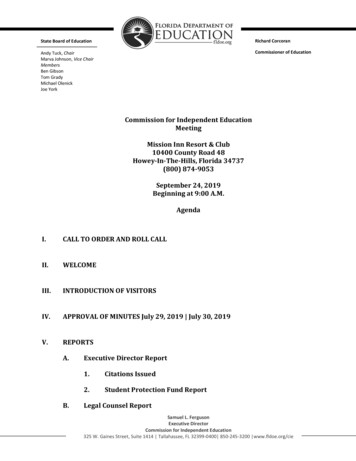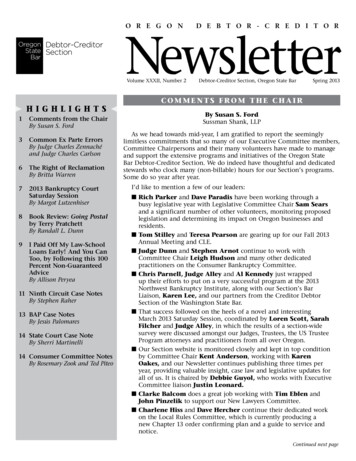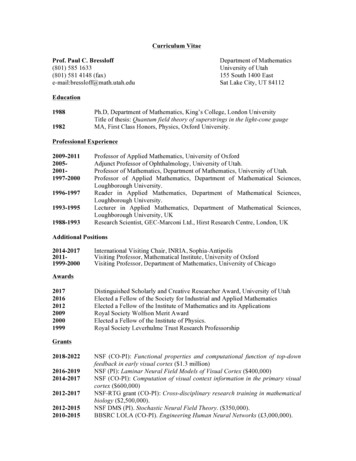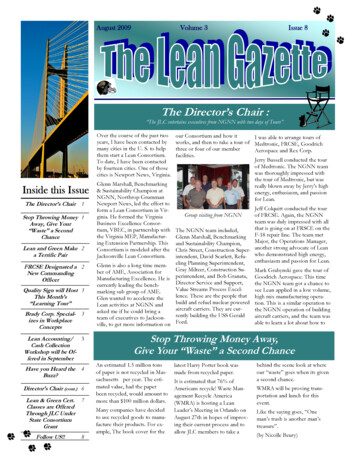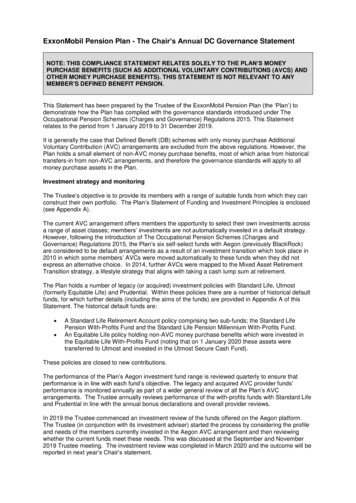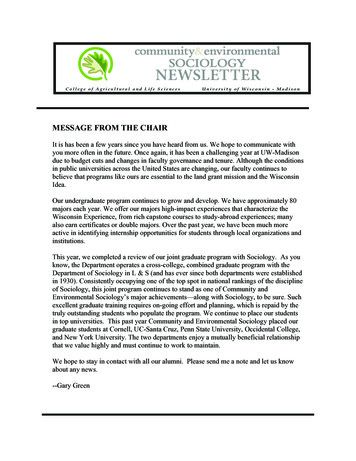
Transcription
MESSAGE FROM THE CHAIRIt is has been a few years since you have heard from us. We hope to communicate withyou more often in the future. Once again, it has been a challenging year at UW-Madisondue to budget cuts and changes in faculty governance and tenure. Although the conditionsin public universities across the United States are changing, our faculty continues tobelieve that programs like ours are essential to the land grant mission and the WisconsinIdea.Our undergraduate program continues to grow and develop. We have approximately 80majors each year. We offer our majors high-impact experiences that characterize theWisconsin Experience, from rich capstone courses to study-abroad experiences; manyalso earn certificates or double majors. Over the past year, we have been much moreactive in identifying internship opportunities for students through local organizations andinstitutions.This year, we completed a review of our joint graduate program with Sociology. As youknow, the Department operates a cross-college, combined graduate program with theDepartment of Sociology in L & S (and has ever since both departments were establishedin 1930). Consistently occupying one of the top spot in national rankings of the disciplineof Sociology, this joint program continues to stand as one of Community andEnvironmental Sociology’s major achievements—along with Sociology, to be sure. Suchexcellent graduate training requires on-going effort and planning, which is repaid by thetruly outstanding students who populate the program. We continue to place our studentsin top universities. This past year Community and Environmental Sociology placed ourgraduate students at Cornell, UC-Santa Cruz, Penn State University, Occidental College,and New York University. The two departments enjoy a mutually beneficial relationshipthat we value highly and must continue to work to maintain.We hope to stay in contact with all our alumni. Please send me a note and let us knowabout any news.--Gary Green
FACULTY & STAFF NEWSMike Bell has published the 5th edition of An Invitation to Environmental Sociology(with Loka Ashwood) and An Invitation to Qualitative Fieldwork (with Jason Orne).Mike also received an award for the best paper published in Rural Sociology: “Linkedand Situated: Grounded Knowledge,” with Loka Ashwood, Noelle Harden, and WilliamBland.Jane Collins received the 2015 Hilldale Award for the social sciences, which is given tofaculty based on their contributions to research, teaching and service. This award isconsidered one of the most prestigious given at UW-Madison.Gary Green published the fourth edition of Asset Building and Community Development(with Anna Haines).Daniel Kleinman’s new book, with Sainath Suryanarayan, called VanishingBees: Science, Politics, and Honey Bee Health, is coming out with Rutgers UniversityPress. Last May, Daniel Kleinman was in Beijing to participate in the “PekingUniversity-University of Wisconsin Workshop in Higher Education,” which he helpedorganize. In the fall of 2014, Daniel Kleinman was appointed the inaugural editor ofEngaging Science, Technology, and Society, the open access journal of the Society for theSocial Studies of Science. Embracing the widespread changes occurring in highereducation and scholarly publishing, the peer review journal sees itself as a place forexperimentation in varieties of article types and ways of representing data. Among thejournal’s editorial board are two UW-Madison Sociology PhDs, Scott Frickel and AbbyKinchy, and a paper by Chelsea Schelly, a recent UW-Madison Sociology PhD, was onof the journal’s earliest articles. Daniel continues to serve as Associate Dean of theGraduate School.Randy Stocker has two new books in press: Liberating Service Learning and the Rest ofHigher Education Civic Engagement (Temple University Press) and The Landscape ofRural Service Learning, and What It Can Teach Us All (Michigan State UniversityPress). Randy is also engaged in an interesting statewide project trying to identifycommunities that are best at attracting and retaining young adults.Sainath Suryanarayanan published two book chapters this year: "Ignorance andIndustry: Agrichemicals and Honey Bee Deaths," (with Daniel Kleinman) in RoutledgeInternational Handbook of Ignorance Studies; and "Pesticides and Pollinators: AContext-Sensitive Policy Approach," in Bee Health at the Intersection of Society andSociety.2
NEW FACULTY--JOSH GAROONOur newest faculty member is Josh Garoon. Joshreceived his Ph.D. from the Johns Hopkins Schoolof Public Health. His dissertation research focusedon community-based natural resourcemanagement and health in rural northern Zambia.He is teaching courses on public health in ruraland urban communities and sociology ofinternational development, environment andsustainability. His current research focuses on theintersection of health, development, and theenvironment at the local level.GRADUATE STUDENT NEWSYifei Li ranked first in the 2015 China Times Young Scholar Award competition, andwas awarded the Yu Chi Chung Scholarship in the amount of 10,000 to support hisdissertation research on China’s environmental governance. Yifei has accepted a tenuretrack position at the Shanghai campus of New York University.Kate Anderson was awarded the UW campus wide "Innovation in Teaching" Award thisyear. She also received a CIAS mini-grant, a grant from WISCER (Wisconsin Collectivefor Ethnographic Research), and a Nelson Institute research travel grant, all for fieldworkfor her dissertation.Annabel Ipsen published an article, "Manufacturing a Natural Advantage," inEnvironmental Sociology.Amanda McMillan Leqieu received a Baldwin Grant from UW-Madison for herresearch on mining in Wisconsin.3
APPLIED POPULATION LABORATORYIt has been an eventful year for the Applied Population Laboratory. Over the stretchof seven months we welcomed two new colleagues, Caitlin McKown and Malia Jones.Caitlin started with us as a GIS Certificate intern and then became part of our stafflast year. Her work centers on using GIS and data visualizations to explore topicsrelated to health geography and health care. Malia Jones joined the APL team lastsummer and is a social epidemiologist working to examine the social and spatialdeterminants of health and develop place-based approaches to exploring socialforces that contribute to differential health outcomes among disadvantagedpopulations. We are very pleased to have both Caitlin and Malia at the APL to helpexpand our growing program in the domain of health and geography.Much of our outreach and Extension work continues to focus on analyzing andtranslating data from the American Community Survey and other state and federalsources. We have taken a look at how Wisconsin’s population is changing and thesocial or economic trends that are affecting Wisconsin communities. Over the lastyear, we have paid particular attention to the growing diversity in ruralcommunities, the age “wave” in Wisconsin, challenges faced by rural school districts,and the persistence of poverty in some Wisconsin counties. We have used datavisualizations, infographics, briefs, press releases, and numerous presentations tostate and local organizations to package up the information and make it available toa wide range of audiences. Our efforts to “democratize” data have also led to a suiteof interactive tools for exploring, visualizing and analyzing data d the WisconsinFood Security Project (http://foodsecurity.wisc.edu/). The Wisconsin Food SecurityProject consolidates an array of community-level information on demographic,socio-economic, health, and food security conditions and presents it alongside dataabout the food infrastructure. The goal of the project is to provide local informationwhich helps planners and policymakers identify strengths and gaps in theircommunities, and helps service providers and individuals and families to locatefood-related resources. We are also hoping to release a revamped version of our allin-one data portal called GetFacts (http:\\www.getfacts.wisc.edu) in the nextseveral months.On the research front, APL staff have been building a body of work on thegeographic aspects of health and health-care and the APL has become a campusleader in Health and GIS research. We have developed innovative population-basedapproaches that attempt to answer the questions "Where?" and "Why there?" forchronic conditions, disease, and other public health concerns. The approaches helpsupport research efforts from around the health and medical world both on and off4
campus and often provide tools which help both researchers and practitioners aliketo explore data, frame public health outreach, and set priorities and policy. APL staffhave also pioneered methods blending applied demography, geography, and publichealth to make projections of health, chronic conditions, and disease for smallgeographic areas. Recently, we developed a set of health projections for the State ofNew Hampshire which have been widely used to target services, allocate resources,and to point the direction for future public health policy and funding for the state.The results of the project can be viewed here: http://www.mapnhhealth.org/healthmap. For information about other outreach and research programs of the AppliedPopulation Laboratory, we invite you to visit us at http://www.apl.wisc.edu.RETIREMENTSTwo of our long-term faculty, Jess Gilbert and Jack Kloppenburg, retired in 2015. Jessand Jack played critical roles in building our program on the Sociology of Agricultureover the past 30 years. Jess recently completed his book on New Deal agricultureprograms (Planning Democracy: Agrarian Intellectuals and the Intended New Deal),which was recently published by Yale University Press. He is currently living in AnnArbor, Michigan. Jack taught courses on food systems and a large introductory course inenvironmental studies for several years. In the last few years, Jack has become active inthe Open Source Seed Initiative and he also served as the director for the Greenhouse, aresidential learning community on campus for students interested in sustainability issues.We will sorely miss both of their contributions to the Department, but we wish themwell!HALLER DISTINGUISHED LECTURE (2016)Sara Bowen delivered the 2016 Haller Distinguished Lecture in April. Sara Bowen is anAssociate Professor of Sociology at North Carolina State University. She is the author ofDivided Spirits: Tequila, Mezcal, and the Politics of Production (University of CaliforniaPress, 2015). Professor Bowen received her Ph.D. in Sociology from the University ofWisconsin-Madison in 2008. Her work focuses on food systems, local and globalinstitutions, and inequality in the United States, Mexico, and France.SLESINGER LECTURE (2016)Celeste Watkins-Hayes delivered the 2016 Slesinger Lecture on March 8. CelesteWatkins-Hayes is an Associate Professor of Sociology and African American Studies atNorthwestern University. The title of her talk was "Remaking a Life, Reversing anEpidemic: HIV/AIDS & the Politics of Transformation."5
ALUMNI NEWSJohn Zinda has a post-doctoral fellowship at Brown University and will be starting atenure-track position at Cornell University this Fall.Jason Orne will be starting a tenure-track job at Drexel in the Fall.John Liu is currently on a post-doctoral fellowship at Harvard and will start a tenuretrack job at Occidental College.Loka Ashwood is an assistant professor at Auburn University.Gina Spitz has a post-doctoral fellowship in urban sociology at Loyola University.Rob Chiles has started his new position as assistant professor at Pennsylvania StateUniversity.Madeleine Fairbairn is now an assistant professor at the University of California-SantaCruz.SUPPORT THE DEPARTMENTThe Department sincerely appreciates your interest in contributing to its future.We invite you to help us achieve our goals and share in our continued successes bymaking a specific financial contribution to any of the following department funds throughthe University of Wisconsin – Foundation. Contributions may be made online or byprinting, filling out and mailing a pdf wf printable form.pdf.Community and Environmental Sociology Department FundPurpose: Unrestricted support for the Department of Community andEnvironmental Sociology. Gifts to this fund are used at the discretion of the Chairand are directed to where the need is greatest.Frederick H. Buttel FundPurpose: Fund supports the recruitment and retention of outstanding scholarsthrough a named Professorship, to be known as the Buttel-Sewell Professorship.Evelyn T. Crowe Scholarship FundPurpose: Fund provides financial awards to Community and EnvironmentalSociology students in the areas of: Participation in professional meetings; Predissertation research; Undergraduate research; Outstanding academic achievementby a senior.Archibald O. Haller Lecture FundPurpose: Fund supports the Haller Distinguished Lectureship Series.A. Eugene Havens Memorial FundPurpose: Fund provides scholarship awards to Community and EnvironmentalSociology, Sociology, and Development Studies graduate students fromdeveloping countries.Doris P. Slesinger Lecture FundPurpose: Fund supports Slesinger Distinguished Lectureship Series.6
ALUMNI UPDATEName:Home Address:E-mail Address:Phone Number:Position:Employers:News to share:Please return to: Community & Environmental sociology Alumni Newsletter1450 Linden Drive, 350 Agricultural Hall, Madison, WI 53706or e-mail information to: gpgreen@wisc.edu7
Caitlin started with us as a GIS Certificate intern and then became part of our staff last year. Her work centers on using GIS and data visualizations to explore topics related to health geography and health care. Malia Jones joined the APL team last summer and is a social
